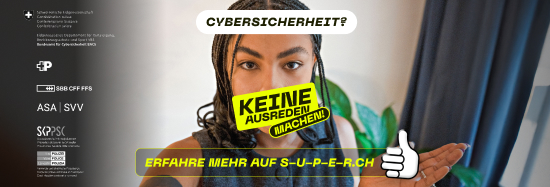08.05.2025 - QR codes are now a common part of everyday life – used for paying bills, parking, or accessing restaurant menus. However, cybercriminals are exploiting this convenience by creating codes that lead to fraudulent websites or redirect payments to unauthorised recipients. The S-U-P-E-R.ch 2025 'No excuses – take action!' campaign highlights the importance of being vigilant when using QR codes and taking active steps to minimise the risks involved.
QR codes are now part of everyday life: we use them to pay bills, pay for parking or view restaurant menus. However, cybercriminals are exploiting this convenience by creating QR codes designed to redirect you to a scam website or steal your personal data (called 'quishing'). This rise in QR code scams has come as people have become more cautious about clicking on links in emails. Links on parking meters, letters or in restaurants now seem more trustworthy. Previously, scammers had to get their victims to manually type in a link, which was tedious and less likely to succeed. QR codes have changed that, making it easier for fraudsters to pull off scams. This change shows why it's important to take a moment to stay safe and question even the most everyday technology.
Check URLs
When you scan a QR code, it's not always clear where the link will take you. Many QR code scanners allow you to preview the URL before you are redirected. This may take a little extra effort, but don't skip it – take the time to check the URL carefully. You can often tell from the URL if the site looks suspicious.
Don't share personal information
No matter where you have scanned a QR code, if you are asked to enter personal information such as your email address, passwords or credit card details, be extremely cautious.
Feel if it's real
A common scam reported to the NCSC involves scammers placing their own QR codes over those on parking meters. When you scan these fake codes, they direct you to a fraudulent website where you're asked to pay your parking fee by credit card – you end up paying the scammers, and often they try to take a lot more than the cost of an hour’s parking! Since the real parking fee hasn't been paid, you could also face a fine. To avoid this, take a moment to check the QR code closely and feel for any stickers covering the original code. The same advice applies here too: take the time to be safe and protect yourself!
Further information
Last modification 08.05.2025







